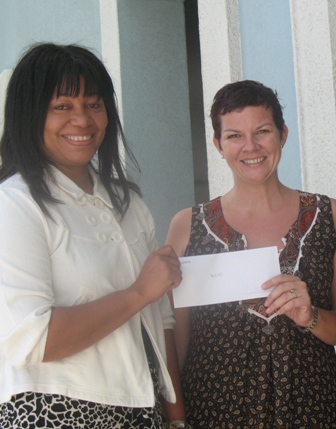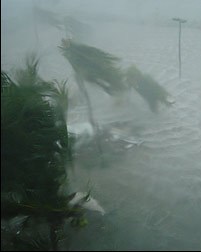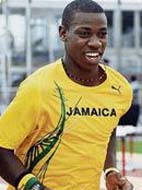Archive for August 11th, 2009

Lawyers get casual for NCVO
 (CNS): Employees from the legal firm Walkers recently gave the National Council of Voluntary Organisations (NCVO) a cheque for CI$ 6,141.96 which they raised through the office ‘Dress Down Programme’. Each month the legal experts make a financial contribution in order to wear casual clothes for the last Friday of the month and then the money collected is given to a local charity selected by the firm on a quarterly basis.
(CNS): Employees from the legal firm Walkers recently gave the National Council of Voluntary Organisations (NCVO) a cheque for CI$ 6,141.96 which they raised through the office ‘Dress Down Programme’. Each month the legal experts make a financial contribution in order to wear casual clothes for the last Friday of the month and then the money collected is given to a local charity selected by the firm on a quarterly basis.
Chief Executive Officer Janice Wilson was delighted to accept the money on behalf of NCVO and explained that the charity’s focus is on children’s services.
“This donation will specifically go towards Summer Camp vacations and a vacation to Little Cayman for the children at the Nadine Andreas Foster Home," she said.
Walkers’ ‘Dress Down Programme’ was started in 2004 and has donated money to numerous local charities including The Kiwanis Club of Grand Cayman, Cayman HospiceCare, the Cayman Islands Cancer Society, Batabano Carnival, the Rotary Club of Grand Cayman, the Cayman Islands Humane Society and the National Trust’s Blue Iguana Recovery Programme.
Earlier this year the sum of CI$6,200 was raised by Walkers staff towards the medical expenses of young Nathan Bendo-Carias who required open heart surgery in Miami, having suffered from an illness for much of his young life. Also identified for assistance this year are the Cayman Islands Cancer Society and the Sunrise Adult Training Centre.
If you like this article, click here to find out how to support CNS
LoGB defends travel and cars
(CNS): Answering critics about his travel bill yesterday, Leader of Government Business McKeeva Bush said that so far he has spent $22,171 for travel since taking office, which he said was essential in his role as tourism minister, his responsibility for financial services and as the country’s leader. He also slammed critics for being bloody minded about the issues of the Protocol Office cars, as well as those making accusations about his wife’s travel costs, who he said were misinformed as he had paid every penny for her out of his own pocket on the occasions she had travelled with him. (Photos courtesy of Cayman 27)
“I am very glad I have a wife of 35 years that wants to travel with me and I’m not bereft of a wife and then have to take someone else’s wife with me!” he exclaimed at a press briefing on Monday morning.
He said the criticisms about his travels were unfounded as he had been forced to go overseas to signthe tax agreements which were crucial to getting the Cayman Islands off the OECD grey list. He said that he would be travelling to Washington today (Tuesday 11 August) to sign Cayman’s twelfth deal with New Zealand, and he said the country was lucky that he did not have to incur the cost of flying to New Zealand and that arrangements had been made to sign the exchange agreement at the embassy there.
Bush explained that, as Leader of Government Business, he has to be the one to travel to sign the deals and that there was no chance of getting the leaders of the Netherlands or Ireland, for example, to come to Cayman. The LoGB confirmed that he did not expect to be travelling at the rate he was currently for very much longer and that it was really the need to sort out the immediate situation regarding the tax deals and tourism meetings that had seen him travel so much in the first few months in office.
He criticised the former tourism minister, Charles Clifford, who he said had ran up a travel bill of almost $250,000 during his time in office and he asked what we had to show for that. Bush said that he had put a stop to a number of the extravagances that Clifford had planned prior to leaving office, such as the inaugural flight celebrations for the Cayman Airways route to Honduras.
He also said that there had been a number of questions about the Protocol Office and the new cars which were being used. Bush admitted that he was being driven around in one of the two vehicles (registration POO2) but denied that his administration had spent $250,000 on any of the cars.
“This car was purchased when the protocol office was set up by the PPM in April 2007,” Bush stated, adding that they did it because they thought they would be re-elected and the former LoGB, Kurt Tibbetts, would become the premier, so had planned to set themselves up. He said that the other car (registration POO1) had been purchased by Arden Mclean when he was a minister, but it has now been turned over to the protocol office.
He saidthe criticism of his travel expenses and the situation around the protocol cars was being pushed by the People’s Progressive Movement in the same way they had pushed the election challenge regarding Mark Scotland. “It is bloody mindedness driven behind scenes by the PPM,” Bush added. He accused the opposition of stirring up controversy over vehicles that they had spent the country’s money on.
The LoGB noted ironically that it was the introduction of the new Constitution that would require the Protocol Office and he admitted for the first time that he had voted against the Constitution during the referendum, which he said would now usher in some expensive changes because of the creation of a premier.
According to a GIS release produced around the time of the Protocol Office’s establishment, there was no mention of the purchase of cars. The release said the office had been established to deal with the courtesies and rules of diplomatic procedure in recognition that government’s structure is becoming more complex. The office’s responsibilities according to that release are handling government hospitality and etiquette, ceremonial events, and assisting with the planning and organisation of official visits as required.
If you like this article, click here to find out how to support CNS

MPs criticise Cayman Constitution on gay rights
 (Pink News): The Cayman Islands new draft constitution has been criticised by UK MPs for deliberately excluding gay rights. A report from the Foreign Affairs Committee described the decision to exclude sexual orientation as a prohibited ground for discrimination was "deplorable" and raised concerns that it breached human rights laws. The report said: "We conclude that the deliberate omission of reference to sexual orientation as a prohibited ground for discrimination in the Cayman Islands draft constitution is deplorable."
(Pink News): The Cayman Islands new draft constitution has been criticised by UK MPs for deliberately excluding gay rights. A report from the Foreign Affairs Committee described the decision to exclude sexual orientation as a prohibited ground for discrimination was "deplorable" and raised concerns that it breached human rights laws. The report said: "We conclude that the deliberate omission of reference to sexual orientation as a prohibited ground for discrimination in the Cayman Islands draft constitution is deplorable."

Atlantic produces timely reminder of hurricane season
 (CNS): In what is proving to be a very peaceful hurricane season so far for the Atlantic, the second tropical depression of the 2009 season formed in the far eastern tropical Atlantic today. However, although things remain relatively calm on the weather front, experts are quick to remind those living in the region not to let their guard down as we enter the peak period for storm formation. According to the National Hurricane Centre in Miami (NHC), satellite images at 6:00am (AST) showed the second tropical depression of the season had formed around 280 miles west of the southernmost Cape Verde Islands.
(CNS): In what is proving to be a very peaceful hurricane season so far for the Atlantic, the second tropical depression of the 2009 season formed in the far eastern tropical Atlantic today. However, although things remain relatively calm on the weather front, experts are quick to remind those living in the region not to let their guard down as we enter the peak period for storm formation. According to the National Hurricane Centre in Miami (NHC), satellite images at 6:00am (AST) showed the second tropical depression of the season had formed around 280 miles west of the southernmost Cape Verde Islands.
The depression is moving toward the west at a13 mph and the NHC said its general motion is expected to continue for the couple of days. With maximum sustained winds near 30 and higher gusts, the NHC said it could become the seasons first named tropical storm within a day or two.
Last week the National Oceanic and Atmospheric Administration (NOAA) Climate Prediction Centre (CPC) lowered its Atlantic forecast for 2009 to a near to below normal hurricane season, as a result of the calming effects of El Niño. However, scientists said the season’s quiet start does not guarantee quiet times ahead. The season, which began June 1, is entering its historical peak period of August through October, when most storms form.
“While this hurricane season has gotten off to quiet start,” said Commerce Secretary Gary Locke. “It’s critical that … people are prepared in case a hurricane strikes.”
Forecasters said there is a 70 percent chance of seven to 11 named storms, of which three to six could become hurricanes, including one to two major hurricanes — category 3, 4 or 5. The main change from the May outlook is that fewer named storms and hurricanes are now expected. The May outlook called for nine to 14 named storms, of which four to seven could become hurricanes. The recent forecast for the return of El Niño – warmer than normal waters along the equatorial central and eastern Pacific Ocean – have come to fruition and is already affecting the upper-level atmospheric pressure and winds across the l tropics.
Gerry Bell, Ph.D, lead seasonal hurricane forecaster at NOAA’s Climate Prediction Center, explained the relationship with hurricanes. “El Niño produces stronger upper-level westerly winds over the Caribbean Sea and tropical Atlantic Ocean, which help to reduce hurricane activity by blowing away the tops of growing thunderstorm clouds that would normally lead to tropical storms,” he said.
Officials in both the US and locally, however, are keen to stress that while El Niño may mean fewer storms compared to recent seasons, it doesn’t mean people can let down their guard.
History reveals that hurricanes do hit even during an El Niño, such as Betsy in 1965, Camille in 1969, Bob in 1991, Danny in 1997 and Lili in 2002. Even though El Niño tends to decrease the numberof storms, other climate factors may help to create some storms. The calm start to this hurricane season is not a reliable indicator of the overall activity for the entire season. The 1992 Atlantic hurricane season, for example, had a below normal number of named storms and hurricanes and the first storm did not form until late August, when Hurricane Andrew hit southern Florida as a destructive category 5 storm.

JA athletes cleared of doping
 (Jamaica Observer): The disciplinary committee of the Jamaica Anti-Doping Commission (JADCO) yesterday cleared the four athletes who returned positive results for banned substances at Jamaica’s National Senior Trials between June 26 and 28, but the athletes’ participation at the 12th IAAF World Championships in Berlin, Germany, remains in doubt. Yohan Blake (left), Marvin Anderson, Allodin Fothergill and Lansford Spence got the verdict from the Kent Gammon-led disciplinary committee yesterday, thus joining Sheri-Ann Brooks, the fifth athlete, who was cleared of doping charges last Wednesday due to procedural errors with the testing of her ‘B’ sample.
(Jamaica Observer): The disciplinary committee of the Jamaica Anti-Doping Commission (JADCO) yesterday cleared the four athletes who returned positive results for banned substances at Jamaica’s National Senior Trials between June 26 and 28, but the athletes’ participation at the 12th IAAF World Championships in Berlin, Germany, remains in doubt. Yohan Blake (left), Marvin Anderson, Allodin Fothergill and Lansford Spence got the verdict from the Kent Gammon-led disciplinary committee yesterday, thus joining Sheri-Ann Brooks, the fifth athlete, who was cleared of doping charges last Wednesday due to procedural errors with the testing of her ‘B’ sample.

Cuba runs out of toilet paper
 (Telegraph): It has survived an economic blockade for almost 50 years but Cuba has finally been laid low by a key shortage: lavatory paper. The state-run company that manufactures the island’s supply has warned that the economic crisis and a series of devastating hurricanes has left it unable to guarantee it will be able to produce or import sufficient supplies again until the end of the year. "The corporation has taken all the steps so that at the end of the year there will be an important importation of toilet paper," said a spokesman for the state conglomerate Cimex. The shipment will enable the state-run company "to supply this demand that today is presenting problems", he added.
(Telegraph): It has survived an economic blockade for almost 50 years but Cuba has finally been laid low by a key shortage: lavatory paper. The state-run company that manufactures the island’s supply has warned that the economic crisis and a series of devastating hurricanes has left it unable to guarantee it will be able to produce or import sufficient supplies again until the end of the year. "The corporation has taken all the steps so that at the end of the year there will be an important importation of toilet paper," said a spokesman for the state conglomerate Cimex. The shipment will enable the state-run company "to supply this demand that today is presenting problems", he added.

Skywatchers set for meteor shower
 (BBC): Skygazers are getting ready to watch the annual Perseid meteor shower, which peaks on Wednesday. The Perseid shower occurs when the Earth passes through a stream of dusty debris from the comet Swift-Tuttle. As this cometary "grit" strikes our atmosphere, it burns up, often creating streaks of light across the sky. This impressive spectacle appears to originate from a point called a "radiant" in the constellation of Perseus – hence the name Perseid. "Earth passes through the densest part of the debris stream sometime on 12 August. Then, you could see dozens of meteors per hour," said Bill Cooke of Nasa’s meteoroid environment office.
(BBC): Skygazers are getting ready to watch the annual Perseid meteor shower, which peaks on Wednesday. The Perseid shower occurs when the Earth passes through a stream of dusty debris from the comet Swift-Tuttle. As this cometary "grit" strikes our atmosphere, it burns up, often creating streaks of light across the sky. This impressive spectacle appears to originate from a point called a "radiant" in the constellation of Perseus – hence the name Perseid. "Earth passes through the densest part of the debris stream sometime on 12 August. Then, you could see dozens of meteors per hour," said Bill Cooke of Nasa’s meteoroid environment office.

Graduates find jobs in China
 (New York Times): Shanghai and Beijing are becoming new lands of opportunity for recent American college graduates who face unemployment nearing double digits at home. Even those with limited or no knowledge of Chinese are heeding the call. They are lured by China’s surging economy, the lower cost of living and a chance to bypass some of the dues-paying that is common to first jobs in the United States. “I’ve seen a surge of young people coming to work in China over the last few years,” said Jack Perkowski, founder of Asimco Technologies, one of the largest automotive parts companies in China.
(New York Times): Shanghai and Beijing are becoming new lands of opportunity for recent American college graduates who face unemployment nearing double digits at home. Even those with limited or no knowledge of Chinese are heeding the call. They are lured by China’s surging economy, the lower cost of living and a chance to bypass some of the dues-paying that is common to first jobs in the United States. “I’ve seen a surge of young people coming to work in China over the last few years,” said Jack Perkowski, founder of Asimco Technologies, one of the largest automotive parts companies in China.

Crime and punishment
It comes as no surprise, given the recent rise in serious crime, that there has been a clamour from the wider community to crack down on criminals and introduce stiffer punishment. However, we should all be cautious of such knee jerk reactions as the relationship between crime and punishment is a complex one.
Calling for the return of corporal and even capital punishment, as some comment makers have on CNS, is very unlikely to do anything concrete to resolve Cayman’s worrying increase in crime. Most criminals do not commit criminal acts based on the level of punishment they would receive if caught. After all, the United States, which has the death penalty in around 35 states, still has some of the highest murder rates in the world. With the exception of Arab states, most countries with low crime rates do not have the death penalty. The common traits among countries with low crime rates is not stiffer penalties but a sense of belonging, strong family ties and places where people feel they have a lot to lose.
Most of us don’t commit murder just because if we did we risk a life sentence; we don’t do it because we have a connection to our fellow human beings, we have a sense of belonging, and lots to lose. We don’t commit crime because of what it would do to our families as much as what it would do to ourselves, and above all because we know it’s wrong and have the intelligence and emotional understanding that society functions better without crime.
Murder rates don’t suddenly increase in countries that reduce the punishment, and crime rarely comes down because the sentences get stiffer.
In reality, punishment has little deterrent effect on anyone — criminal or otherwise. If we as a community are going to really address the rise in crime we have to look far more closely at why so many people are committing crime and behaving violently. Addressing the break down of the family, community alienation, hopelessness, addiction and other social problems will have far more of an impact on criminality that introducing the ‘whip’ as one regular comment maker on CNS would have us do.
While there are more obvious things that may help bring down crime statistics, such as improving morale and training in the police service and intercepting the exceptionally high number of weapons that are finding their way on to our streets, what we need to do is look at the underlying causes of crime in the community.
We have to tackle those difficult issues which will stop our young people from shooting each other rather than trying to lock them all up in an already overcrowded prison that offers no rehabilitation and, to be honest, not much long term protection for the community. Aside from the fact that one inmate has been charged with murder while serving a sentence, the prison does not offer a place where people can be rehabilitated, and the criminals who go in come out more often than not better equipped to commit crime than when they went in.
Over the years the criminal justice system in Cayman has spent very little time looking at rehabilitation or studying the reasons why people become involved in crime in a community that is, relatively speaking, affluent. While poverty is often a driving cause of crime and drug misuse which leads to more crime, Cayman by global standards – even with our current financial woes – is a wealthy community. Few people go hungry, most have a roof over their heads and opportunities are relatively plenty.
We can only assume, therefore, that there is an emotional disconnect in our community and what is becoming an increasingly dysfunctional society. The society at large is failing many of our young people, who are emotionally distraught and starved of affection and not enough people are telling them they are cared for and worthy. Young people join gangs to find a sense of belonging that they are not getting from family, friends or their communities. And while the conservatives among us are quick to criticize the concept of building self esteem as rather wishy-washy and politically correct — instilling a sense of worth in people is essential to making law abiding citizens.
Material things have replaced the fundamentals of human need, which is to feel loved, safe and respected. While tackling the social, emotional and psychological reasons for crime are rarely vote winners, they are more often than not the route to a lower crime society. Of course, draconian action can curb crime. If the RCIPS were to announce tomorrow that there will be a curfew introduced on everyone between 7:30 pm and 5:30 am and anyone breaking it will be shot on sight, we will likely see a drop in the crime statistics, but I think we might just see a rapid decline in the population as well and before we know it there’d be no one left to rob or kill anyway.
The complexities of crime and punishment are such that we need to find the balance to protect law abiding people’s liberties while at the same time fostering an environment where crime is unacceptable. But we can only do that by more intelligent methods. Punishment will not prevent crime but merely put a temporary hold on individual criminals. Imprisonment is as much about protecting society from those likely to harm it than it is about stopping them from doing that harm. It is also about retribution — society demands that you pay if you break the rules. We are kidding ourselves, however, if we believe it is any kind of deterrent regardless of whether the prisoners are subjected to a diet of bread and water or living it up, as some people seem to think, at Northward.
Sadly what prison is not, either here in Cayman or in many other communities, is a place of reflection, learning, rehabilitation or the restoration of humanity.
Society at large is as much to blame for its crime levels as the criminals, but it is not too late for us to reconsider the ‘whys’ and ‘hows’ of criminal behaviour and to use our criminal justice system to begin to repair those who are damaged and find out why, so if nothing else we can prevent others from following the same route. Tackling crime requires a holistic approach that must permeate into the very essence of the society and the community and a far more intelligent response than more punishment and more pain.